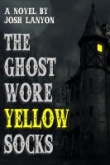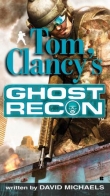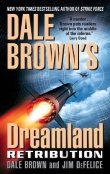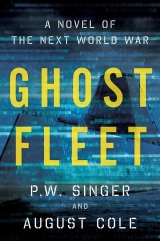
Текст книги "Ghost Fleet: A Novel of the Next World War"
Автор книги: P. Singer
Соавторы: August Cole
Жанр:
Триллеры
сообщить о нарушении
Текущая страница: 15 (всего у книги 37 страниц)
Fort Mason, San Francisco
Jamie Simmons slipped into bed, but he was too wired to fall right asleep. He thought of all the cobbled together Ghost Fleet ships in the Bay. His own ship, the one that the country needed most, was turning out to be the weak link. He lay back, studying the fog bank, now at the deck level of the Golden Gate Bridge. Its rise was almost imperceptible until it obscured something big from view. There was nothing you could do to drive it away. It did not have the tide’s regularity, and for that reason it was all the more spectacular when it robbed you of the sight of something you took for granted, like the bridge.
A loud gurgle of the pipes woke Lindsey, who groggily turned over.
“You’re here. I didn’t hear you come in,” she said.
“Yeah,” he whispered, “I didn’t want to wake you. What’s all that with the pipes?” he asked.
“Toilet,” she said, starting to wake up. “Broken again.”
“Damn it,” he said. “I’ll take a look in the morning.”
“When? You’re always out so early,” she said.
“Then when I get home,” he said.
“And when will that be, Jamie? You can get a warship fixed up, but the toilet is too much to handle?” she said. “I’m sure that makes sense to somebody, just not me anymore.”
There was an old Navy saying that ships were like mistresses: beautiful, alluring, mysterious, requiring lots of attention, and, ultimately, marriage killers.
“I’ll look at it right now,” he said. The edge in his voice caused her to prop herself up on one elbow and study him.
“You can say it, Jamie,” she said. “Whatever you want, just say it.”
He kissed her on the forehead, not trusting anything that might come out of his mouth. His heavy footsteps said enough. The same frustration he felt at work was now part of his home.
After a half hour of struggling in vain with the toilet, he gave up and went back to the bedroom to find the kids asleep in bed with Lindsey. He must have woken them with all the rummaging around with the tools his father had left wedged behind the sink. He sat down in the old leather recliner in the corner of the room and watched them in the near darkness, trying to let the sounds of the trio’s breathing drain away his stress and frustration. What he wanted to fix most, he feared he could not.
When he woke, it was just past five in the morning. Shit. He had overslept by an hour.
“Did you fix the potty, Daddy?” asked Martin groggily from the bed.
“No, sweetie, it’s still broken,” he said.
“Call Grandpa! He can fix it,” said Claire.
“You should call him,” said Lindsey, eyeing him warily.
He shook his head as the room’s sensors picked up their movement and began to gradually brighten the overhead lights. “I said I’m gonna fix it and I will.”
“We want Grandpa!” Claire and Martin shouted.
“It’s not time to get up yet, kids,” said Lindsey, shooing them out of the bed. “Back to your rooms.”
“We’re not calling him,” said Jamie in a whisper as she walked past, leading the kids down the hall.
He went to the bathroom and showered. Under the unrelenting spray of the cold water he cursed himself. There were too few days before he went out to sea for them to have a night like this. He turned off the shower and shivered. Was this how his dad had felt when he helplessly watched his connection with the family fray? Or had he just been unwilling to try to fix it? That was the difference; his dad hadn’t wanted to try. It had to be the difference. Jamie was not willing to give up.
I’m a better man than my dad, Jamie told himself as he blinked away the fatigue and cold water. Even on my worst days.
Honolulu, Hawaii Special Administrative Zone
Carrie wiped her hands on the front of the old black Hurley pullover that she’d worn to the beach. Then she took her backpack into the bathroom and shut the door.
She pulled her still-wet bathing-suit bottom out of the bag, tossed it into the shower, and rinsed out the sand in the hot water. Then, as the bathroom filled with steam, she undressed, looking at herself in the fogged mirror. The naked body she saw, its beauty obscured by the moisture on the glass, could have been anybody’s. She was anonymous.
After she got out of the shower, she pulled a small makeup compact from the backpack. She tapped it twice on the counter and the cover popped up. She licked her index finger on her right hand and rubbed it around the rim of the compact. There.
She held up her hand to the light and saw the hair. She pulled her fiancé’s black plastic brush from the jewelry box on the counter. She blew gently on her finger, and the hair fell onto the brush. Carefully, she put the brush back in the box.
Carrie sat down on the toilet and closed her eyes. Now she saw them again. Then she saw her fiancé, and, finally, she saw her father.
The inch-long cuts she made on her left thigh wiped the images of the men away. Eyes still shut, she didn’t see the blood dripping onto the blue tile at her feet. The clatter of the scissors on the floor jarred her back from the moment. She stifled a cry of pain and began to wipe the blood away with her palms. She moved to the sink for a towel and then stopped. The fog on the mirror receded just enough for Carrie to look herself in the eyes. I am not anonymous, she told herself. I am death.
Wal-Mart Printing Facility, Ogden, Utah
In many ways it was like watching an old Xerox copy machine in action. A thin layer of graphene chips was sprayed down by a roller that moved from one side of the table to the other. Essentially carbon atoms laid out in the same hexagonal structure of chicken wire, graphene was light and strong, and it was a great conductor. But more important, it was made from the same carbon atoms that formed everything from graphite to charcoal, so it could be sourced easily. Indeed, the graphene in this run of the machine had been pulled from the smoke of a coal-fired power plant.
There was a burning smell as a laser fired, igniting a tiny flame where the light beam came into contact with the graphene dust, melting and fusing the particles together. Then the roller swept back in the other direction, laying down another thin layer, the laser firing again, back and forth, back and forth.
In each microscopic layer, the laser carved out new shapes in the powder. Slowly, a form began to rise, akin to pieces of paper stacking up. As the laser fused it all together, the form grew into an intricate latticework, almost like a honeycomb. The roller paused as a robotic hand reached over, turned the object thirty degrees, and inserted a feed of electrical wire, and then the layering began again. In ten minutes, the form was complete. The robotic hand reached back in and lifted it up, and a spray of air blew off the remaining dust that clung to the object. The arm then moved the object outside the machine and put it in a cardboard box. After sixty forms had been placed in the box, an alarm rang.
A human worker scurried over, quickly closed the box, and ran a line of packing tape over it, sealing it shut. He slapped a barcode sticker on it, and another worker loaded the box onto a robotic pallet mover that drove itself down the aisles. Where once garden gnomes and children’s bicycles had been stacked and stored, ready for distribution across the retail network, there now stood boxes of reverse-engineered spare parts, from machine-gun belts to wheel brackets to, in this case, a power coupling needed at Mare Island. Outside the warehouse, an eighteen-wheeler truck waited with a manifest for the various items that would be distributed and delivered by the next day.
Back inside, the direct-digital manufacturing machine, also known as a 3-D printer, continued its work. A new software package had been downloaded, and now the device began to build an entirely different object. The process had the efficiency of an assembly line but the flexibility to shift on demand and build any design that could be modeled with computer software.
And, even better, it could reproduce itself. The protocol, as voted on by Lee-Ann’s shareholders, dictated that every tenth run would produce parts for additional 3-D printers. These would then be sold at a discount to the firms that had originally been in Wal-Mart’s supply chain. The seeds of both a manufacturing revolution and a new kind of defense industrial complex were being sown within the world’s largest retail chain.
Lotus Flower Club, Former French Concession, Shanghai
Ritual could be deadly. But ritual also offered its own protection. If you followed the same patterns day after day after day, those watching knew that you had nothing to hide.
So Russian air force major general Sergei Sechin had been going to the Lotus Flower Club now for three years. The same girl. He never asked her name. He knew her only by her number: Twenty-Three.
Twenty-Three wore her jet-black hair short, cropped in a spiky mess that looked sultry, not sloppy. She might have been from Tibet; he wasn’t sure. He never asked, never bothered her with fake conversation. Maybe that was why her dark eyes seemed to light up just a slight bit whenever she saw Sechin, which was once every two weeks. That was enough. He was no longer a young man.
She was chipped, of course. His Chinese counterparts could have all the biofeedback they wanted of an old man’s best effort at screwing his way toward a fleeting moment of escape from age and decay. But at the Lotus Flower Club, that also meant she was wired into the room’s screens on all four walls and the ceiling. The screens pulsed colors depending on her level of arousal. Whatever pills she took worked, because the explosions of light that finished off each session were unlike anything Sechin had ever seen. It was like an aurora borealis in the bedroom.
The concierge guided Sechin to his usual room and left him. Sechin knocked once, then entered.
But she was not the usual Twenty-Three.
The girl under the purple sheets had blue hair and sharp Nordic features.
Shit. Moscow must have sent her. If this was an attempt to kill him, it was not the way he’d thought it would happen. He turned to leave. Let them shoot me in the back, the cowards.
“Be’ ’IH mej ’Iv?” she said.
He froze.
Klingon. She had just spoken Klingon.
“What did you say?” he asked.
“Be’ ’IH mej ’Iv?” she repeated.
Now he was intrigued. This was too artful for the Directorate or his own intelligence service.
“Who leaves a beautiful woman” indeed?
He sat on the bed and placed one hand on her leg.
“So, we have a language in common – what shall we talk about?” he replied in Klingon.
“Come here,” she said. “I’m cold. I need you to warm me.”
“If you’re not careful, such clumsy talk may make an old man lose his will,” he said.
“Perhaps I can help.” Then she lowered the sheet, revealing her breasts. “I can make them bigger if you like,” she said. “Or smaller. Whatever you wish.” She put a device the size of a matchbox on the nightstand.
Biomorphic breast augmentation was increasingly common, and inexpensive, in China. In Russia, it was taboo and therefore a rarity. Whoever had performed the surgery was very talented.
“There’s no need,” said Sechin under his breath. “They’re perfect as they are. Really.”
He undressed quickly, leaving his clothes in a pile at the foot of the bed.
“Your socks,” she said with a giggle.
“What about them?” he said as he climbed in.
“You can take them off,” she said.
“Never. So I can make a quick getaway,” he said with a wink.
“Not too quick, please,” she said. She pulled the sheets over them. Then she pulled another blanket made of thin metallic fabric over the sheets.
She put a hand over his mouth, and her eyes turned cold and serious, and Sechin realized he was probably not going to get laid. Nor was he going to die. The good with the bad. Such is the intelligence business, he thought.
She stuck her hand out from under the bed’s blanket, and he heard a faint click. What he heard next stunned him. The sounds of Sechin and the previous Twenty-Three making love echoed through the room. Do I really sound like that? Like a boar with a spear stuck in its side, he thought.
“Our mutual friend from the Federation sends his best,” she whispered in his ear.
So the American had heard him after all.
“Then tell me this: Why did he not listen to me when it mattered?” said Sechin. “I risked everything just by using the word Cherenkov. He could have done something.”
“He is doing something now, and you can too,” she said.
“Wait, are you chipped?” he asked.
“Yes, but not by Lotus Flower. I’m still a new girl,” she said. “They’re going to wait to see if I work out before they invest in me. Now tell me about Cherenkov, and none of the Star Trek shit.”
The air under the blanket was heating up quickly and Sechin felt his face flushing from the warmth and his proximity to her. He watched a rivulet of sweat carve an arc between her breasts and move toward an enormous tattoo wreathing her waist.
“It was developed about three years ago at the Russian Foundation for Advanced Research Projects outside Moscow, our equivalent to your DARPA,” he said. “It’s nuclear-reactor detection from space.”
“How does it work?” she asked.
“There is not enough time now. I will get you something to take to them next time,” he said. “I suppose your superiors will also need to know why I am doing this?”
“Why you’re in bed with me, you mean?” she said.
“They would understand that, I hope. Americans are not that prudish,” he said.
“Okay, then, why?” she asked.
“Our dear leader so badly wants to matter in his old age that he fails to see that one day this will all go bad for Russia. America and Russia had our row in the last century, and it is done. I’ve been here long enough to know that the Directorate is the real threat, and this war only makes them stronger. Russia is merely the junior partner, and it just happens to have fifteen million Chinese residing inside its borders. It does not take an old spy to see that one day very soon the Chinese will assert their ‘right to protect’ their compatriots in Siberia, just as we once did to the weak states on our borders. So that is why I tried to warn your officer, for all the good it did.”
“It’s usually more personal. What do you want from this?” she said.
Sechin sighed and ran a finger between her breasts.
“My dear,” he said. “Don’t we all want the same thing? Money? Sex? A bit of power. Any of the three are fine with me. I’m not particular anymore.”
She rolled her eyes. At that moment, the recording of one of his sessions with Twenty-Three ended with an animal abruptness. She reached out to start the recording over.
“Don’t worry, it’s been modified so it will sound like we’re beginning again,” she whispered in his ear, then she pulled back and looked him in the eye as the grunts started once more. “I don’t believe you. We’ve seen your profile. You’re too much of a romantic for the usual banal causes.”
“ ‘Too much of a romantic’ says the whore I am in bed with.”
“Okay, have it your way,” she said. Her voice went from a purr to command mode. “Put your hand here.”
She took his hand and placed it at her waist, stopping at the tattoo. “Do you know what that is?”
He didn’t feel a thing, but he knew enough to make a guess. “It’s one of the new e-tattoos.”
She looked surprised for a second.
“I am not as old as you might think,” he said.
The ink of the tattoo was actually a derivative of the electronic ink used in the old tablet-computer readers. This modified version allowed the liquid injected into the skin to act as a sort of pillow above and below tiny embedded silicon chips wired together in an origami-like pattern. The liquid and microscopic serpentine wires formed a miniature network woven into her skin. He closed his eyes and traced its outlines while he hummed the middle section of Dmitri Shostakovich’s Fifth Symphony.
“I’m going to need you to do something for me, and I can’t lie, it’s going to hurt,” she finally said. “But we think it’s the best way to securely get us the information you offer.”
“I was afraid you might ask that,” he said.
She kissed him gently on the chin.
“How can you know pleasure without understanding pain?” she responded as she kissed him again.
North Fork of the Kaukonahua Stream, Oahu, Hawaii Special Administrative Zone
“Push the pace,” Conan hissed, walking in the knee-deep river water. “Or we’re going to miss our window to get inside the perimeter.”
Finn didn’t reply; the only noise was his sandals’ soft sucking in the mud.
The stream was low, hedged in on either side by thick emerald vegetation and slashes of brown. The two walked with hunched backs, their wool blankets drooping heavily on aching shoulders. They were the tail end of the patrol, four more Muj strung out ahead. Charlie had point. He wasn’t military like the rest, but it was time to break him in. He’d been a golf pro at the Turtle Bay Resort, once a star player for Wake Forest University but never making it past the Nike tour level. Finn had served with Charlie’s older brother Aaron, the three of them going out drinking whenever Aaron visited on leave. The Muj had used Charlie’s apartment as a hide site two months back, and he had demanded to go with them. Charlie had said that his big brother had kicked his ass bad enough when they were little, and he wouldn’t survive what happened after the war if Aaron found out he hadn’t been in the fight.
The cuts and scrapes on their legs attested to the night’s hike almost to the top of a nearby peak. They had pulled up a hundred and fifty yards short of the summit to avoid highlighting their position along the ridge line, and Conan had disappeared for an hour while the rest set a security detail below. Conan would not tell Finn or any of the others why they’d had to go there. They knew she kept it from them for operational security, but it still made the whole trek a sullen expedition.
Now, after a long hike back down, it was raining. Finn splashed into the swollen stream behind Conan and trudged on through the water. Going that way, they left no tracks and erased their movement signature in case they were being monitored from above, but really, he’d have chosen to go the stream route anyway. He had an infected cut on his heel that felt better in the water.
They arrived at a small pedestrian bridge they had hidden the bicycles under. It was a motley mix they’d picked up along the way, just like their array of weapons. Finn had scored the best, a 27.5-inch wheeled carbon downhill mountain bike with motorcycle-like suspension they’d stolen from a vacation villa whose owners were unlikely to come back until the war was over. Conan rode a three-speed faded green beater with a narrow white racing seat that they’d found unlocked by the side of the road. Their guess was that it had been a drunk-cycle, a bike used to pedal from bar to bar, before it was pressed into wartime duty.
They left in ones and twos, going out through Hidden Valley Estates to California Avenue. Movement in the open like this had to be carefully choreographed because of the Directorate’s tracking algorithms, which pored through aerial and satellite-sensor footage. Over time, any unusual patterns would become distinct and therefore targetable. The trick was to find patterns that were part of the standard ebb and flow but also had slightly random components that could explain away any anomalies. Patterns like the daily rhythms of kids biking to and from their elementary school.
As the flow of children heading into Iliahi Elementary School, a few on their own, others dropped off by their parents, started to slow, Conan nodded at Finn. Like on patrol, they staggered their arrivals. They’d go in with the latecomers and then swing toward the back, where there was an outbuilding used for storing athletic equipment. For the past four months, Coach Moaki, the gym teacher, had allowed the Muj to stash a few boxes of grenades, stims, and ammunition there. The insurgents also slept there from time to time. It was one of many caches they used in the area. They knew a few of the other teachers were likely aware of what they were doing, but not a single one ever made eye contact with them.
“You know, before all this I used to do triathlons,” Finn said to Conan as they waited in the vegetation by the road. “Get up at oh-five-hundred for a trail run and then go twenty miles on the bike. Oh, and camping. For fun. That’s pretty much what we’re doing now, right? Well, screw that. When this is all over, I’m going to move to New York City and never go outside again.”
They had just mounted their bikes when a shot rang out.
“Pistol,” said Conan. “At the school.”

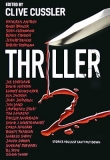
![Книга [Magazine 1966-07] - The Ghost Riders Affair автора Harry Whittington](http://itexts.net/files/books/110/oblozhka-knigi-magazine-1966-07-the-ghost-riders-affair-199012.jpg)
